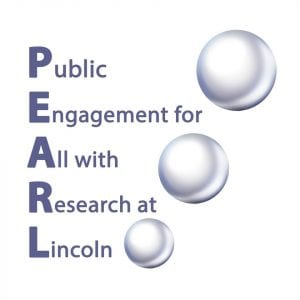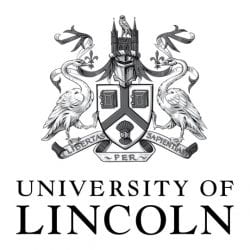 Thank you to everyone who answered the ‘Public Engagement for All with Research at Lincoln’ (PEARL) Survey in October. An impressive 277 staff and students answered (our target was 250), providing invaluable insight into the university’s perceived performance in the different areas required to produce great Public Engagement with Research (PER). This allowed identification of areas where the additional effort provided by RCUK’s 2017-18 PEARL grant can most usefully be deployed.
Thank you to everyone who answered the ‘Public Engagement for All with Research at Lincoln’ (PEARL) Survey in October. An impressive 277 staff and students answered (our target was 250), providing invaluable insight into the university’s perceived performance in the different areas required to produce great Public Engagement with Research (PER). This allowed identification of areas where the additional effort provided by RCUK’s 2017-18 PEARL grant can most usefully be deployed.
Questions in the survey were taken directly from the National Coordinating Centre for Public Engagement (NCCPE) and covered aspects of the university’s PER effectiveness in 3 broad areas: (1) how effectively it communicates its purpose regarding public engagement, (2) how effectively it supports the process of public engagement and (3) how effectively it provides opportunities for people. There were three questions in each category, and respondents could select one of four answers to each question describing the university’s performance for that area.
Overall, one of the questions which received the most responses in the top category was in respect of ‘leadership’, with 26% of respondents agreeing with the top-ranked answer to Question 2 “The VC acts as a champion for public engagement and a senior leader takes formal responsibility. All senior leaders have an understanding of the importance and value of public engagement to the institution’s agenda”. In the survey overall, the ‘Purpose’ section scored best, with 454 responses in the top half of the table, compared with 345 and 332 for the ‘Process’ and ‘People’ sections respectively, which is in line with trends found across UK Universities (RCUK 2016).
In the ‘Process’ section ‘Recognition’ (Question 6) in particular was identified as lacking (or patchy) with 69% of respondents placing it in the bottom two categories, perceiving either absence of reward or recognition for PER (27% of responses), or a very ad hoc system for this in some departments only (42% of responses). However, just over 30% of responses did rate ‘recognition’ in one of the two top answer categories, confirming that formal recognition/reward of PER activity is noted in some areas. This suggests that while the university has support in place for PER, it should look to further develop this through increased CPD opportunities and reward for PER.
The responses in the ‘People’ section were also mixed, with the majority feeling that public needs and interests regarding engaging with the university had not been effectively assessed, and nearly the same rating opportunities for staff to get involved in PER in the bottom half of the table. Views regarding opportunities for students to get involved were much more positive, with this question receiving the joint-highest number of top-rated responses, 26% of respondents agreeing that “All students have the opportunity to get involved in public engagement, and are encouraged and supported to do so. The institution offers both formal and informal ways to recognize and reward their involvement.”
There were no major trends or significant differences between colleges in their answers to questions, but analysing the data by occupation suggested that students’ responses were on average most positive and academics’ views were least positive (Figure 1). Overall, the picture which emerges is one of a university community strongly aware of the need to engage with wider publics and appreciative of senior management’s commitment to this, but also aware of the need for greater support and formal recognition for staff (in particular) to fulfil these ambitions within already busy professional lives. The picture at Lincoln reflects the national one in which PER often happens in fragmented pockets and constant pressure on academics’ time leaves little room for PER especially when this is often not necessarily recognised and rewarded. The PEARL grant for 2017-18 will help address these issues at Lincoln, running a second survey to identify precisely what training and CPD university members would like to have available, bringing in new reward systems for PER and finding out more about how wider publics would like to engage with the university.

What happens next?
Survey results will inform PEARL as it adds support, visibility and opportunities for PER at Lincoln. A follow-up survey coming soon will look to further identify how staff and students would like to see PER change e.g. training/CPD, and begin to link up PER activities at the university by asking you to tell us about any PER work you are doing.
Beyond this, you will very soon see additional PER opportunities will start to become available; to join our Public Engagement Researcher Directory, receive PER training and apply for funding. You can follow us on; Facebook (@UniLincolnPublicEngagement); Twitter (@UniLincolnPEARL) and our new website (http://pearl.blogs.lincoln.ac.uk) to keep up to date with all the latest.
If you have any questions or if you’d like more information, please email on pearl@lincoln.ac.uk, and we can provide further information. If you’d like to get involved or would like to join our newsletter, we would love to hear from you on the email above.
